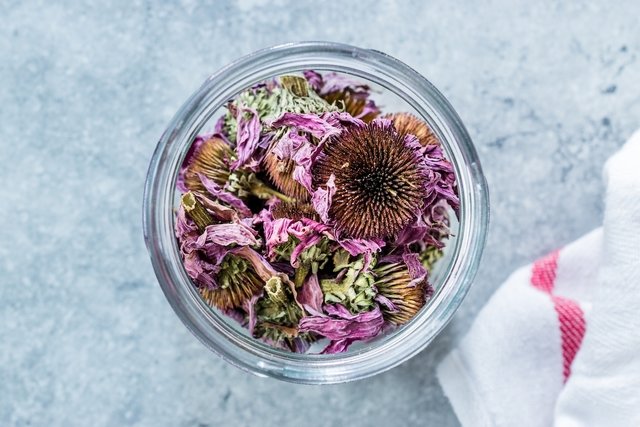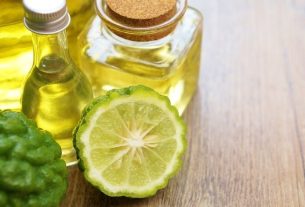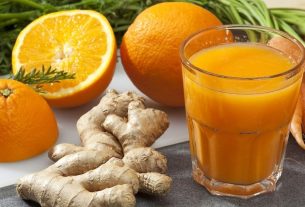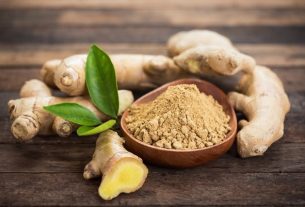Home remedies for cold sores, such as licorice tea or thyme infusion, for example, have antiviral, anti-inflammatory, analgesic, antioxidant and healing effects, which help to alleviate the symptoms of cold sores such as itching, burning sensations, redness and swelling.
Cold sores are an infection caused by the Herpes simplex virus that is usually transmitted through direct contact with another person’s herpes sore or by sharing drinking glasses or unprotected intimate contact. Cold sores are characterized by the formation of inflamed open sores around the mouth, which last about 7 to 10 days. Check out all the symptoms of cold sores.
These home remedies can be used from the first symptoms of cold sores until the appearance of the sores and, although they cannot replace medical treatment, they are a good option for relieving symptoms and speeding up recovery.
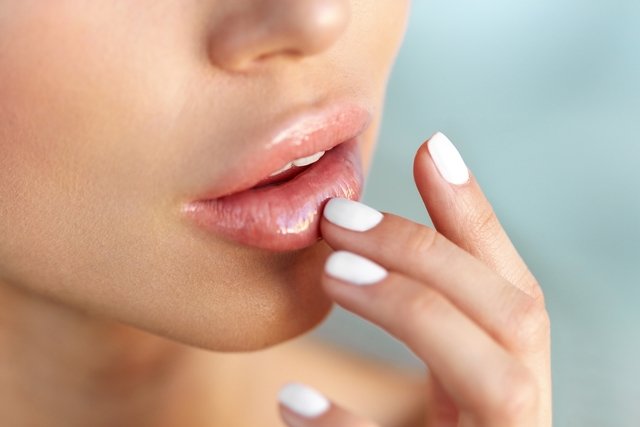
1. Propolis extract
Propolis extract is a great home remedy option for cold sores, as it has phenolic compounds, flavonoids and caffeic and cinnamic acids, with antiviral action, inhibiting the multiplication of the virus, in addition to reducing pain and swelling and improving healing. , as it has analgesic, anesthetic, antioxidant and anti-inflammatory properties.
Furthermore, some studies show that propolis extract is more effective than acyclovir, an antiviral used to treat cold sores.
How to use: To use propolis, apply 3 to 4 drops of the extract to the wounds, about 3 times a day.
Propolis extract should not be used by people with allergies to propolis, honey or pollen.
2. Lemon balm tea
Lemon balm tea is rich in phenolic compounds such as caffeic, rosmarinic and feluric acids, which prevent the cold sore virus from multiplying, preventing the spread of infection, reducing healing time and relieving typical cold sore symptoms such as itching, tingling, burning, stinging, swelling and redness.
Ingredients:
- 3 tablespoons of lemon balm leaves;
- 1 cup of boiling water.
Preparation mode:
Add the lemon balm leaves to the boiling water, cover and let it rest for 5 to 10 minutes. Then, strain and drink 3 to 4 cups of this tea per day.
3. Peppermint essential oil
Peppermint essential oil is rich in menthol, menthone, cineole and limonene, with antiviral properties that prevent the replication of the herpes virus, in addition to having anti-inflammatory and antiseptic action, helping to combat the symptoms of cold sores such as pain , swelling and redness.
Ingredients:
- 2 to 3 drops of peppermint essential oil;
- 1 glass of water.
Preparation mode:
Add the drops of peppermint essential oil to the glass of water and mix. Place a little of this mixture on a clean, dry cotton pad and apply it to the cold sore wound for 30 to 40 seconds, 2 to 3 times a day.
4. Licorice tea
Licorice tea contains glycyrrhizin and glycyrrhizic acid, substances with antiviral and anti-inflammatory properties, which act to inhibit the growth of the cold sore virus and reduce the inflammation of wounds, combating symptoms of redness, swelling and pain.
Ingredients:
- 1 teaspoon of licorice root;
- 1 cup of boiling water.
Preparation mode:
Add the licorice to the cup of boiling water, cover and let it rest for 10 minutes. Strain and drink this tea up to 2 times a day.
Licorice tea should not be consumed by pregnant or breastfeeding women and by people with heart problems.
5. Thyme infusion
Thyme infusion is another good home remedy option for cold sores, as it is rich in substances such as rosmarinic acid, apigenin and luteolin, which have antiviral action and therefore help fight the cold sore virus, in addition to having antioxidant properties that help strengthen the immune system, accelerating healing and allowing for faster recovery.
Ingredients:
- 1 to 2 coffee spoons of dried thyme leaves;
- 200 mL of boiling water.
Preparation mode:
Add dried thyme leaves to boiling water. Cover for about 10 minutes, strain and drink 1 to 2 cups a day for a maximum of 7 days.
Thyme infusion should not be consumed by pregnant or breastfeeding women and by people with heart problems, gastritis or stomach ulcers.
6. Sage and rhubarb tea
Sage and rhubarb tea is rich in cineole, camphor, anthocyanins and proanthocyanidins, which are substances with antiviral, antioxidant and anti-inflammatory properties, which act by preventing the multiplication of the cold sore virus and reducing symptoms of itching, redness and pain .
Additionally, some studies show that sage and rhubarb may be as effective in treating cold sores as the antiviral medication acyclovir.
Ingredients:
- 1 tablespoon of sage leaves;
- 2 tablespoons of rhubarb stem;
- 500 mL of boiling water.
Preparation mode:
Add the sage leaves and rhubarb stem to the boiling water. Let it rest for about 5 to 10 minutes. Strain and drink 1 cup of tea up to 3 times a day.
Sage and rhubarb tea should not be consumed by pregnant or breastfeeding women and people with epilepsy.
7. Echinacea tea
Echinacea tea is rich in antioxidant, anti-inflammatory and immunomodulatory substances, such as flavonoids and chicoric and rosmarinic acids, which help reduce the production of substances that can cause pain, swelling, redness and a burning sensation in wounds, in addition to strengthening the immune system, speeding up recovery time from cold sores.
Ingredients:
- 1 teaspoon of echinacea root or leaves;
- 1 cup of boiling water.
Preparation mode:
To use echinacea leaves, add them to a cup of boiling water and let it rest for 5 to 10 minutes. As for the echinacea root, you must boil the root together with water for 10 to 15 minutes. Strain and drink twice a day.
8. Blackberry tea
Blackberry tea has antiviral, antioxidant and anti-inflammatory properties, as it contains compounds such as anthocyanins, ellagitannins, quercetin and procyanidin, which act by preventing the multiplication and causing the death of the cold sore virus, in addition to reducing the symptoms of itching, redness , pain and swelling, improving wound healing.
Ingredients:
- 5 chopped blackberry leaves;
- 300 mL of water.
Preparation mode:
Place the ingredients in a pan and let it boil for a few minutes. Soak a cotton ball in the still warm tea and apply directly to the wounds.
Blackberry tea should not be consumed by diabetic people as it can interfere with the action of diabetes medications and cause a hypoglycemia crisis.
9. Garlic and ginger tea
Garlic and ginger tea has antioxidant and anti-inflammatory properties due to allicin, a substance present in garlic, and compounds such as gingerol, chogaol and zingerone, in ginger, which act to alleviate the symptoms of cold sores such as pain, discomfort, itching and wound irritation. Furthermore, this tea also helps to heal herpes wounds, preventing the emergence of infections on the lips.
Ingredients:
- 3 cloves of garlic, peeled and cut in half;
- 1 cm of ginger root or ½ teaspoon of powdered ginger;
- 1 liter of water.
Preparation mode:
Boil water with garlic. Remove from heat and add the ginger. Let it rest for 5 to 10 minutes. Strain and then drink up to 3 to 4 divided doses throughout the day. This tea can also be applied directly to cold sores, using clean, dry cotton.
Ginger should not be consumed by people using anticoagulants, and therefore should be removed from the tea in these cases.
10. Pomegranate tea
Pomegranate tea is rich in tannins, which are substances that have antiviral action against the cold sore virus, helping to eliminate the virus more quickly and accelerating the healing of the wound on the lip.
Ingredients:
- 1 pomegranate;
- 300 mL of water.
Preparation mode:
Remove the pomegranate skin and the films that cover the seeds inside and place it in a pan with water and let it boil for 20 to 30 minutes. Wait for it to cool and strain. Apply the mixture with the help of a clean, dry piece of cotton to the herpes wound, 3 to 5 times a day.
11. Elderberry tea
Elderberry tea contains quercetin and kaempferol, compounds with antiviral action, preventing the multiplication of the cold sore virus, in addition to reducing pain and swelling and improving healing, as it has antioxidant and anti-inflammatory properties.
Ingredients:
- 1 tablespoon of elderflower flowers;
- 1 cup of boiling water.
Preparation mode:
Add the elderflowers to the cup of boiling water and let it rest for 5 to 10 minutes. Strain, let it cool and drink the mixture 2 to 3 times a day. The tea can also be applied directly to the cold sore several times a day.

Sign up for our newsletter and stay up to date with exclusive news
that can transform your routine!
Warning: Undefined array key "title" in /home/storelat/public_html/wp-content/plugins/link-whisper-premium/templates/frontend/related-posts.php on line 12
Warning: Undefined array key "title_tag" in /home/storelat/public_html/wp-content/plugins/link-whisper-premium/templates/frontend/related-posts.php on line 13

